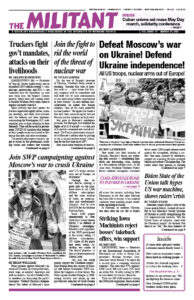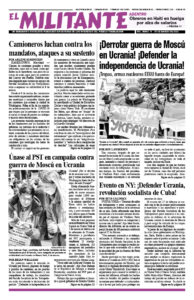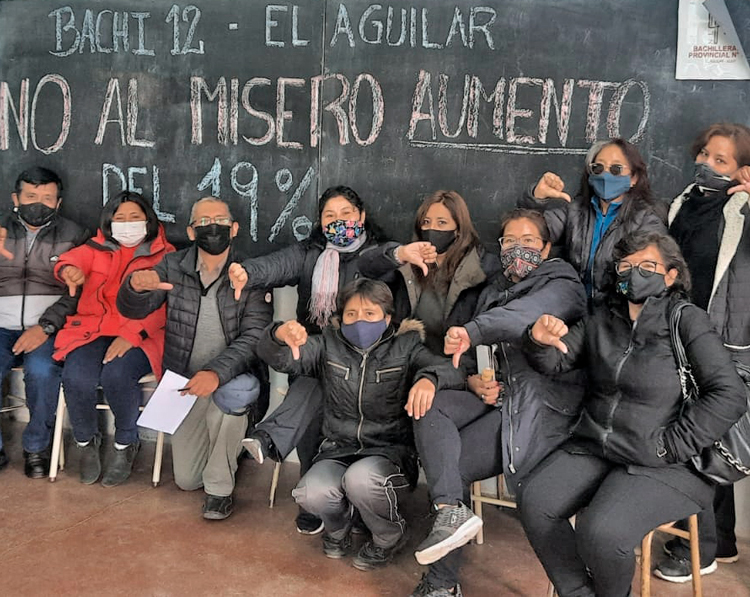A deal between the government of Argentine President Alberto Fernández and the International Monetary Fund to refinance $44.5 billion in debt owed to wealthy bondholders awaits the approval of the country’s legislature. If adopted, the unending cycle of paying off part of the staggering foreign debt with yet more loans will start again, making another default inevitable down the line, with ruinous consequences for working people.
The government was expected to pay the IMF $19 billion this year and a similar amount next year on a $57 billion three-year bailout loan granted in 2018. The latest deal would be the 22nd such arrangement in the country’s history.
Fernández claimed Jan. 28 the agreement “will allow us to grow and meet our obligations through growth.”
A new postponement of debt payments will not bring capitalist growth and stability in Argentina — much less relief for working people. Over decades, every loan “restructuring” move by finance capital has only reinforced debt slavery, making the economy of Argentina and other semicolonial nations ever more dependent on the imperialist powers. The purpose of such “relief” measures is simply to make sure the debt repayments, with interest, don’t stop filling the imperialist coffers.
Argentina’s debt to imperialist banks and financial institutions is now $323 billion. That vast amount approaches what the foreign debt was for all of Latin America in the mid-1980s.
One of the IMF’s requirements for the deal is that Buenos Aires cut spending on programs that millions of working people rely on. The agreement includes cuts to government subsidies for electric and gas rates and public transportation.
As part of the deal, Argentina’s central bank raised its interest rates Feb. 17. That will mean steeper payments on individual mortgages, credit cards, and car loans, and an even higher overall household debt. All this as working people face the scourge of rising prices.
Workers face acute conditions
The official unemployment rate is more than 10%, and inflation has been running above 50% a year, dealing blows to workers’ real wages. Today, in a country of 45 million people, 10 million rely on food assistance.
The effects of a recession that began in 2018 were aggravated by the COVID-related lockdowns, which left millions without jobs and income for much of the past two years.
People are concerned “not about eating well, but about simply having enough to eat,” Dina Sánchez, spokesperson of the Darío Santillán Popular Front, told the Global Press Journal in August.
Her organization runs soup kitchens. In Villa 21-24, one of the many shantytowns that ring Buenos Aires, the city government supplies the group’s kitchen with food to feed 160 people a day. But over the course of the lockdowns demand has skyrocketed, and they’ve have had to “do magic” to try to stretch the food to serve nearly 500 meals daily, Sánchez said.
Despite enduring one of the world’s longest and harshest lockdowns, Argentina has had 2,765 COVID-related deaths per 1 million inhabitants.
The government’s measures did not change the underlying social causes of the pandemic’s devastating impact — from lack of drinking water, reliable electric service and decent housing in many working-class neighborhoods to child malnutrition, which affects about 40% of the country’s children.
Many workers faced the bitter choice of either buying internet data so their children could attend “virtual schooling” or feeding their family. “We had to start going to a food pantry because we couldn’t afford to pay for it and continue buying food,” Romina Cejas, an unemployed housekeeper and babysitter, told Global Press.
On Feb. 16, nurses hired on a temporary basis at hospitals and vaccination centers marched in Buenos Aires to demand they be hired permanently, as the end of their employment contracts neared. In response, the city government announced a “contest” to keep 1,200 of the 3,800 nurses. Protesters noted that hospitals were already short 5,000 nurses before the pandemic.
Peronist government crisis
Pressure to meet demands of the imperialist creditors by imposing more belt-tightening measures on broad layers of the population is fracturing the governing Frente de Todos (Front for Everyone) coalition, made up of the different factions of the Peronist party and middle-class radical organizations.
The coalition was dealt a setback in November parliamentary elections, losing control of the Senate to a coalition of center-right parties.
Now, vice president — and former president — Cristina Fernández de Kirchner has threatened to lead a vote against the IMF package if “better terms” are not reached, seeking to distance herself from the president.
Since the end of World War II, when former Col. Juan Domingo Perón came to power, the Peronist party has been the political mainstay of capitalist rule in Argentina. While claiming to champion the interests of working people, it has served to subordinate workers’ interests to the bosses, tie the union movement to the state, and act as a brake on working-class struggles.
The government of Néstor Kirchner furthered this course between 2003 and 2007 by co-opting practically the entire middle-class left into government posts and programs. This has continued today. Leaders of left-wing groups, including those who took over unemployed workers’ organizations that emerged during the crisis of the 1990s, are now in charge of a multitude of government-funded services and cooperatives. The orientation of all these groups, from the Communist Party to various Trotskyist formations, is to get elected to government office.
The acute economic and social crisis, however, has increasingly discredited the Peronist-led government among broad layers of working people. While there are no big labor struggles today, skirmishes continue to break out, from shipyard workers in La Plata fighting for back pay to construction workers in Córdoba striking for health care and pension benefits.


